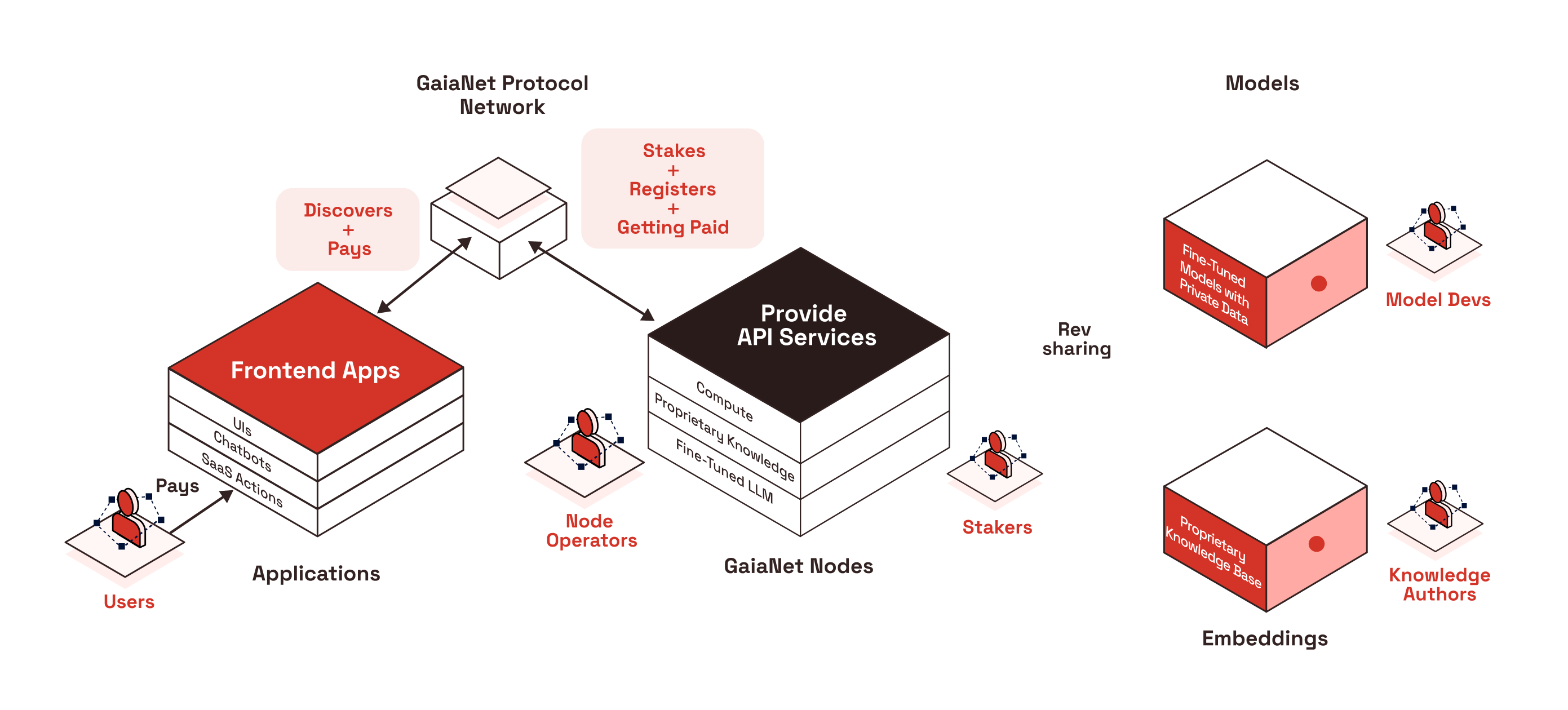返回
GaiaNet Node
GaiaNet
By HackQuest
Sep 18,20243 min readWelcome to the Web3 world, where digital finance and applications are shown in a revolutionary way through the fusion of blockchain technology, cryptocurrencies, and a pioneering spirit. Are you overwhelmed by the wealth of terms in the Web3 world that you don’t understand? Are those slang barriers for you to learn about Web3? Don’t worry! We’re here to explain the obscure terms to guide your learning. Today, we're diving into an innovative development in the world of Web3: GaiaNet Node.
Definition and Overview
A GaiaNet Node is a decentralized computing infrastructure that empowers individuals and businesses to create, deploy, scale, and monetize AI agents. These agents can reflect the unique styles, values, knowledge, and expertise of their creators. GaiaNet enables seamless integration of AI technology, allowing users to leverage advanced capabilities through a decentralized network of nodes. Each GaiaNet node can be customized and fine-tuned to serve specific domains or applications, providing a versatile and powerful alternative to traditional AI platforms.

Source : Medium
Technical Composition
At its core, a GaiaNet Node consists of several key components:
1.Web-Based Chatbot UI: Each node features an intuitive web-based chatbot interface, allowing users to interact with AI agents tailored to specific expertise, such as Ethereum.
2.OpenAI Compatible API: GaiaNet nodes offer an API compatible with the OpenAI ecosystem, enabling users to integrate GaiaNet seamlessly into existing AI applications. This compatibility ensures that GaiaNet can serve as a drop-in replacement for OpenAI, providing enhanced customization and domain-specific knowledge.
3.Customizable Models: Unlike the generic models provided by platforms like OpenAI, GaiaNet nodes can be heavily customized. Users can fine-tune models with specialized knowledge, making them more adept at handling domain-specific queries. For instance, a GaiaNet node designed for financial analysis can generate SQL code to query SEC 10K filings, delivering precise and relevant responses.

Source : Gaianet.ai
Core Functions
GaiaNet Nodes are designed to perform several essential functions:
●AI Agent Creation: Users can create AI agents that embody their unique expertise and knowledge.
●Deployment and Scaling: GaiaNet provides the infrastructure to deploy and scale these AI agents, ensuring they can handle varying loads and demands.
●Monetization: Individuals and businesses can monetize their AI agents by offering specialized services through GaiaNet.
●Domain-Specific Customization: Each node can be fine-tuned with specific knowledge and expertise, enhancing the accuracy and relevance of responses.
●API Integration: The OpenAI compatible API allows for easy integration with existing AI applications, expanding the reach and utility of GaiaNet nodes.
Use Cases
GaiaNet Nodes offer a wide range of applications, including but not limited to:
●Financial Analysis: Nodes can be customized to analyze financial data, generate reports, and answer complex queries.
●Healthcare: Medical professionals can create AI agents that provide expert advice and insights based on the latest medical research.
●Legal: Law firms can deploy AI agents to assist with legal research, case analysis, and document generation.
●Education: Educators can develop AI tutors that offer personalized learning experiences and answer student questions.
●Blockchain and Cryptocurrency: Experts in blockchain technology can create AI agents that provide insights into various crypto assets, smart contracts, and decentralized finance (DeFi) applications.

Source : Medium
Importance in Web3 Ecosystem
GaiaNet Nodes play a crucial role in the Web3 ecosystem by democratizing access to AI technology. By allowing individuals and businesses to create and deploy their AI agents, GaiaNet fosters innovation and decentralization. This aligns with the core principles of Web3, which emphasize user empowerment, transparency, and the elimination of centralized control.
Challenges
Despite its numerous advantages, GaiaNet faces several challenges:
●Scalability: Ensuring that the network can handle a growing number of nodes and users without compromising performance.
●Security: Protecting the data and models used by GaiaNet nodes from potential threats and breaches.
●Adoption: Encouraging widespread adoption of GaiaNet in a competitive market dominated by established AI platforms.
Conclusion
GaiaNet Nodes represent a significant advancement in the Web3 ecosystem, offering a decentralized and customizable approach to AI technology. By enabling individuals and businesses to create, deploy, scale, and monetize AI agents, GaiaNet fosters innovation and empowers users. While challenges remain, the potential of GaiaNet to revolutionize the AI landscape is immense. As Web3 continues to evolve, GaiaNet Nodes will likely play a pivotal role in shaping the future of decentralized AI.
In the ever-evolving world of Web3, staying informed and understanding new technologies is essential. GaiaNet Nodes provide a glimpse into the future of AI, where decentralization and customization pave the way for innovative solutions tailored to individual needs. Whether you're a developer, business owner, or tech enthusiast, GaiaNet offers exciting possibilities for leveraging AI in the decentralized era.